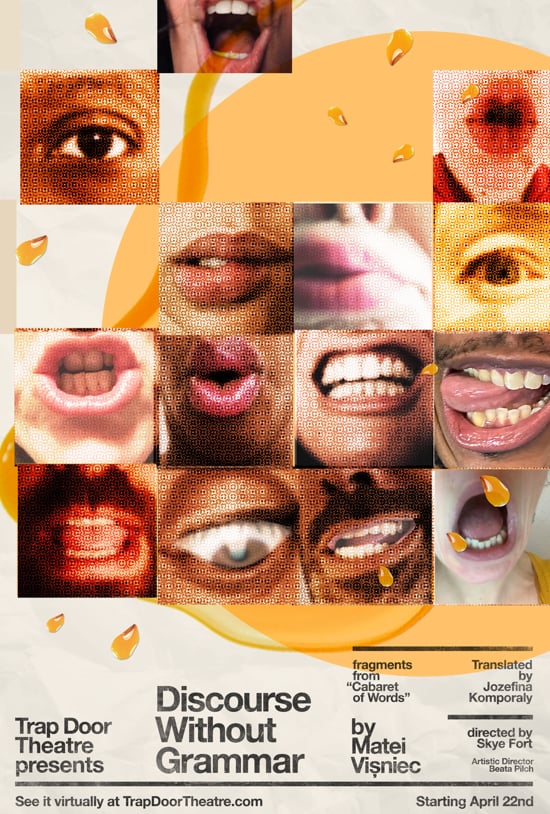
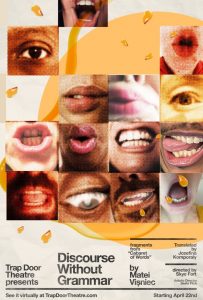 Recommended *** A year ago, theatre companies had to rapidly pivot to making online content. Although the themes of disaster, civil unrest, and institutional dysfunction presented obvious subject matter, those productions stretched isolated artists’ resourcefulness and were widely understood to be stop-gaps. Now, with reopenings into a much more uncertain world tentatively on the horizon, companies planning programming for the fall recognize that the biggest question on everyone’s mind is: have we learned anything? Trap Door Theatre’s new movie, Discourse without Grammar, doesn’t answer that. Formulated from excerpts of Romanian dissident playwright Matei Vişniec’s Cabaret of Words, it asks whether it is even possible for us to formulate meaningful questions after we have become accustomed to filtering the rote language of our newscasters, public relations departments, and marketeers.
Recommended *** A year ago, theatre companies had to rapidly pivot to making online content. Although the themes of disaster, civil unrest, and institutional dysfunction presented obvious subject matter, those productions stretched isolated artists’ resourcefulness and were widely understood to be stop-gaps. Now, with reopenings into a much more uncertain world tentatively on the horizon, companies planning programming for the fall recognize that the biggest question on everyone’s mind is: have we learned anything? Trap Door Theatre’s new movie, Discourse without Grammar, doesn’t answer that. Formulated from excerpts of Romanian dissident playwright Matei Vişniec’s Cabaret of Words, it asks whether it is even possible for us to formulate meaningful questions after we have become accustomed to filtering the rote language of our newscasters, public relations departments, and marketeers.
“Civic models…tradition…and..future!” a distressed woman mutters as she puts on clown makeup. It looks like a living meme, but for her, it’s also the beginning of a journey. Played by Marzena Bukowska, the brave clown goes on a journey through the wilderness, finding objects that clearly have some vital meaning to her, even if the rest of us can barely guess as to what. She declares that she has become the vector for the concept of desire itself, facilitating the connection between it and other words. But when she sees the aggregation of the meanings she has constructed, she suddenly realizes she has trapped herself in something not nearly as innocent. The movie takes a turn for the sinister, and despite sound designer Michael Mejia’s meditative synth music, a creeping feeling of foreboding never entirely vanishes.
The opening sequence with the existentialist clown is one of the more straightforward of the ten segments. Each of them features an actor in a different environment, constructing their own meaning out of the excerpts of ungrammatical pablum director Skye Fort sent them, along with props from children’s make-believe games. Emily Lotspeich plays a recurring character who is a sort of all-purpose spokesmodel for capitalistic democracy, emphatically proclaiming “Fellow citizens! This crucial is year! Country generous!” as she glamorously day-drinks on a treadmill. Other, more vulnerable characters struggle with how to express themselves through their fragments, or perhaps, are limited by their fragments into how they can perceive their lives. One man (Carl Wisniewski) becomes steadily more defensive of a living space he has set up on a curb, brandishing a list of his rights that mostly just consists of the word “mobilization.” He seems to have taught himself to get a dopamine jolt from blurting it, or yells “mobilization,” and “important opportunity” whenever something pleases him. Elsewhere, a talking head pundit (Assaf Hochman) has similarly fallen in love with the words “advantage major” and solemnly intones about how very many advantages his party possesses and provides.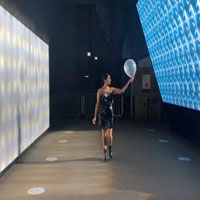
If this all seems rather post-modern, that doesn’t mean it’s devoid of compassion. The web cameras are almost always very close to each actor’s face, creating far more nuanced and humanistic portraits than is possible for Theatre of the Absurd in a live playing space, even as intimate as the one Trap Door usually performs in. Discourse without Grammar is not even necessarily pessimistic, since many of the words in the collages do symbolize nice things that are hard to quantify, and several segments end in ways that could be interpreted as escape or transcension. (The press release describes this experiment as “joyful.”) But the movie is bookended by emergency broadcasting color bars and an authoritative-sounding voice reassuring us that, in the event of an actual emergency, we would be provided with official news or instructions. We obviously have a lot more reason to wonder about claims like that now, and Discourse, which is available for rent on Vimeo indefinitely, may help us to recall this moment should things seem to normalize.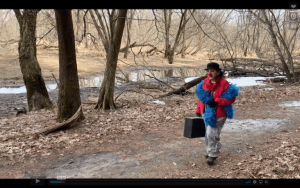
Tickets are $15. Once accessed, the video may be viewed repeatedly over a period of forty-eight hours. Running time is a little over an hour.
To learn more, visit Trap Door Theatre.
To see what others are saying, visit www.theatreinchicago.com, go to Review Round-Up and click “Discourse without Grammar.”


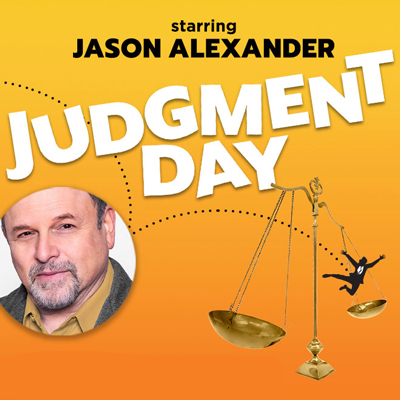
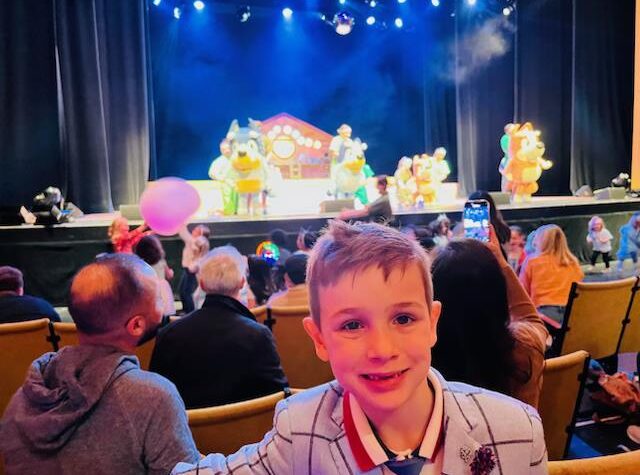

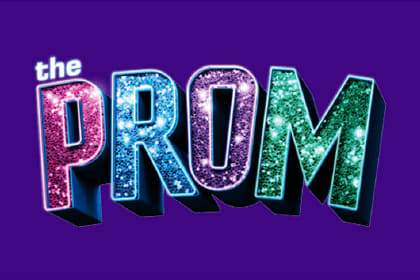
More Stories
“Judgement Day”
“Bluey’s Big Play” reviewed by Tommaso Casati
“Beautiful: The Carole King Musical”